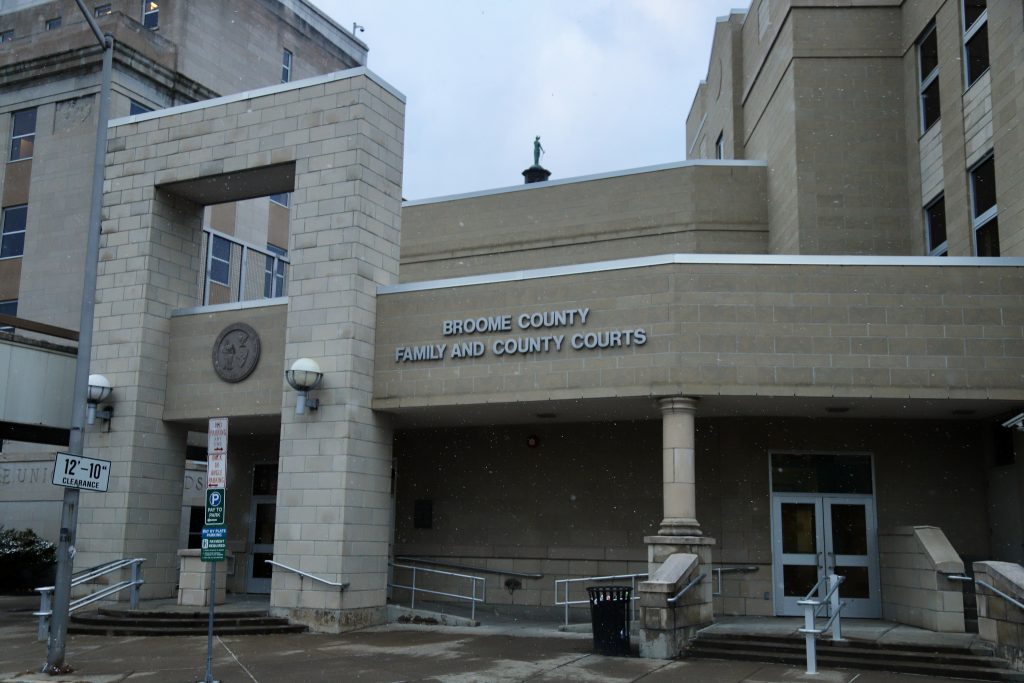In 2017, Liz L. fatally stabbed her boyfriend after years of domestic violence issues, subsequently pleading guilty to first-degree manslaughter — for which she was sentenced to 10 years in prison. Her sentence was reduced by an appeals court after a legal battle, and she was released from the Broome County Jail on Dec. 8.
The legal developments in Liz L.’s case were spurred by the Domestic Violence Survivors Justice Act (DVSJA), a piece of legislation passed by the State Legislature in 2019 that allows courts to consider resentencing in specific cases where domestic abuse survivors commit crimes against their abusers as a result of the abuse, and are serving a sentence of at least eight years. The Third Division of the New York State Supreme Court’s Appellate Division reversed the decision of a lower court, reducing her sentence to five years, with two and a half years of post-release supervision. Liz L.’s had served over six years of the original sentence.
Michael Baker, the Broome County public defender, expressed relief at the resentencing in Liz L.’s case.
“I think it was a case that always kind of bothered me, and I never felt comfortable with it,” Baker said. “There were certainly some self-defense issues and deeper issues regarding that she was an abused person in a very, very toxic relationship. It felt so good when we called her that Wednesday when the decision came, to tell her she was getting out of prison.”
To be eligible for resentencing under the law, a survivor must prove that they were a victim of domestic violence at the time of the offense and that it was a “significant contributing factor.” In its ruling, the Appeals Court, which referred to Liz L.’s boyfriend as a “paramour,” found that the County Court had improperly applied the DVJSA in its initial review. According to the court documents, Liz L. woke her paramour and he became aggressive, cornering her in a room. Liz L. testified that she felt that she would lose her life and that she had no escape. A mom of two children, she was 28 at the time and had been in a relationship with the paramour since she was 18.
“Our review of the record reveals that [the] defendant had been subjected to years of ongoing and substantial physical and psychological abuse by the paramour, including in the presence of their children, up to the date of the incident,” the court wrote in its order.
Karin Portlock, a partner at Gibson, Dunn & Crutcher, LLP, worked extensively on Liz L.’s legal case. She mentioned its larger impact on future DVJSA applications.
“It was a tremendous privilege to represent [her] in this appeal,” Portlock wrote in an email. “She is precisely the survivor the DVJSA was enacted to help, and it has been truly fulfilling to achieve justice for her. In addition, our team is particularly proud of the precedent that has been set by the Third Department’s decision, which paves the way for future survivors.”
Mary Saitta, the special prosecutor in the case, declined to comment.
Kate Mogulescu ‘99, a professor of clinical law at Brooklyn Law School and the director of the Survivors Justice Project, has worked to implement the DVSJA since its passage, coordinating with public defenders across the state. She explained that the trial court that initially heard Liz L.’s resentencing case denied her in early 2022, leading Liz L. to file an appeal.
In addition to the Survivors Justice Project, the clinic at Brooklyn Law School works closely with incarcerated individuals to file applications for resentencing under the DVSJA. At this point, the clinic has successfully secured the release of 12 domestic violence survivors from prison in 10 different counties.
Addressing the challenges facing incarcerated individuals reentering society, Mogulescu emphasized the importance of community efforts.
“The most effective thing that has been done to support people upon reentry is local grassroots organizing, that comes from a place of care rather than control,” Mogolescu wrote in an email. “There are many collective efforts, led by people who have experienced incarceration themselves, that use empowerment, community and respect to counter the marginalization and oppression of the criminal legal system.”
Robert Rose, an intern at the Public Defender’s Office and a sophomore majoring in philosophy, politics and law, said many recently incarcerated individuals rely on local programs to reenter society. He added that depending on location, some of these programs are well-funded — while others are not — and in Broome County, some individuals attempting to seek help during emergencies are forced to wait for hours, making them more likely to re-offend.
When working on Liz L.’s case, Rose said he spent a lot of time analyzing the DVSJA, which gave him further insight into the criminal justice system.
“I have gained a newfound appreciation for just how much work goes into each and every case on the part of attorneys, investigators, social workers and support staff alike,” Rose wrote in an email. “It has given me a lot of reasons to be optimistic about the general direction in which the system is going. I think genuine, good change, that is good for both those who wish to get a second chance and for society itself, is possible.”
Editor’s Note (12/29/23): This article has used a shortened version of the defendants name for anonymity.



